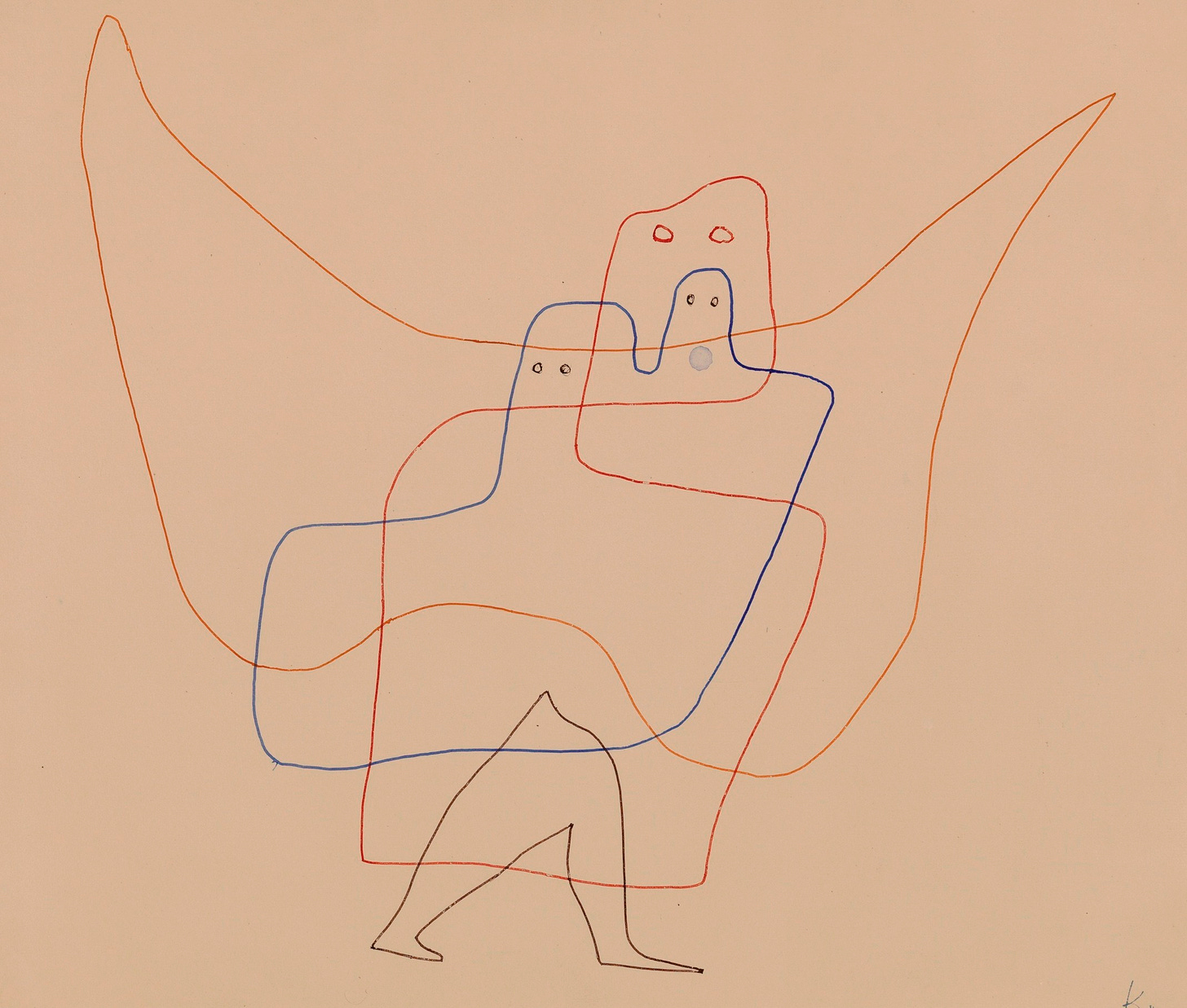Five Poems by Paul Klee
With some process notes starring D.H. Lawrence, Harry Nilsson, and The Incredible String Band.
Along with my other projects, I’ve steadily been translating more poems by Paul Klee. As I’ve mentioned before, Klee never published any poetry during his lifetime, and what we have is recontextualized (and somewhat reconstructed) from his voluminous notebooks. The poems are casual, unpolished—verbal sketches to generate and amplify his visual art. You might think this would make my job easy, but precisely the opposite is true.
The poems are rhymed for one thing. English is famously, notoriously, and correctly identified as difficult (but not impossible) to rhyme in. This difference in difficulties makes it so that rhymes in German and English are incommensurate. There just aren’t as many in German. They don’t have the same impact. But preserving as much rhyme as possible felt like the right choice—(it usually doesn’t)—for this project. Klee’s versified notes harken back to premodern methods of learning and retaining information. In the absence of permanent records, rhyme serves as the pneumonic device, a way of chunking together discrete pieces of linguistic data.
But rhyming translation meant having to develop techniques. My favorite way of mitigating difficulty is using English-language writers as models, that is, writers whose tone, subject, and formal elements match up with the writer I’m translating. For Klee, I’ve settled on D.H. Lawrence, Harry Nilsson, and The Incredible String Band.
From Lawrence, I get a certain idiosyncratic totemism, particularly of animals vilified by the traditional Christian culture of Europe. Klee doesn’t have the same programmatic orientation, no pagan revival of fleshy intuition over bourgeois morality for him, not overtly at least. But he does share with Lawrence a closely-observed affection for things that “creepeth upon the earth” as the KJV Leviticus puts it.
He lifted his head from his drinking, as cattle do, And looked at me vaguely, as drinking cattle do, And flickered his two-forked tongue from his lips, and mused a moment, And stooped and drank a little more, Being earth-brown, earth-golden from the burning bowels of the earth
From “Snake” by D.H. Lawrence.
Though I’ve never read or heard it acknowledged, I sense quite a bit of Lawrence in the English psychedelic folk group The Incredible String Band, to the point that I thought they outright borrowed lines from the Lawrence poem in their song “Yellow Snake”. Search engines falsify this impression, but I still can’t help hearing the song as somewhat of Lawrence pastiche.
Someone you saw Stretched sleeping on the sand Five withered violets cradled in his hand His dreams are so loud calling in your ear The yellow snake coils from the water And all is refreshed far and near
But I shouldn’t sell The Incredible String Band short on originality. Their meandering song structures and free-associative lyrics were highly influential on much more popular groups, notably Led Zeppelin, with their characteristic abrupt shifts in meter, rhyme scheme, and subject matter. What binds their songs together (and Klee’s poems too) is a gnomic playfulness and a metaphysical outlook that can be critical, satirical but, unlike Lawrence, doesn’t become shrill with polemic.
Peacocks talking of the color gray Awaking soundly in darkest day A howling tempest on a silent sea Lovely Jesus nailed to a tree I had a little letter full of paper Inky scratches everywhere Always looking, looking for a paradise island Help me find it everywhere
From “Ducks on a Pond” by The Incredible String Band
The absurd, the paradoxical, and the whimsical are also modes that Harry Nilsson worked in, and like Klee, they moderate and modulate an underlying darkness, especially his songs for Robert Altman’s Popeye musical. They have a real unreality that is more than cartoonish, complimenting the erie dystopian setting of Sweet Haven. Popeye’s home port has more in common with the oil camps in There Will Be Blood than it does with Bikini Bottom, but then again Spongebob is a bit dystopian too. Anyway, this fucked vibe is especially apparent in “Everything is Food”, Nilsson’s macabre paean to the trophic cycle of dead flesh sustaining living organisms.
Everything is meat, meat, meat Careful what you put on your feet Once it lived on an ani-mule Now it walks along with you
And now, for now, no more process; here are some newly (or newly-ish) translated Klee poems:
[1915] my star rose up from deep underfoot where winters my fox? where sleeps my snake? – help build – bird that singeth deer that springeth worm in earth fish in firth on crag the flower to God help build the Tower Echo: «To God» Acclaim Dumbwaiter! Smashdriver! Shitstirrer! Licecatcher! Bookwormer! a Flyleaf! a Sneakthief! of all these titles, I was their owner though now my star burns somewhat colder maladroit. maneuverable smoothresistant – coexistent plupersistant. beg mercy, distant soul make me deep for I went it was evening the cloud cover it cloaked the light then nothing shadowed above all take care what burns your blood what coals make white through rills runs light seven veils veiling visage! One day I’ll lie supine beside an angel of some kind [Note on Büchner's Danton's Death] Storm and Worm Song and Stress Worm and Song Stress and Storm Answer I am slave or master like you no one smaller goes by shoe



Lovely! Really like your translations of Klee. Am a major fan of very short poetry, so was right up my alley. :-) Looking forward to exploring more of your newsletter.